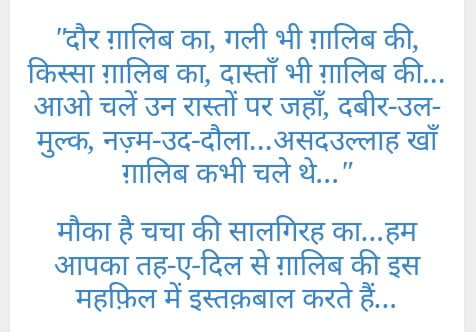Mirza Asadullah Baig Khan (27 December 1797- 15 February 1869) is remembered even today as one of the most loved poets of all times. According to Ralph Russell, a litterateur,” Ghalib would have been the greatest poet had he spoken in English”.
But just as the Punjabi word ‘Khasmanu Khaniye’ (literally, husband eater) would lose its charm when translated to English, so would the Great Ghalib’s works.
Originally a Turk, Mirza Asadullah Khan started writing at the age of 11 and adopted ‘Asad’ and ‘Ghalib’ as his pen names, where Ghalib itself means ‘dominant’.
While many of those who have read Ghalib would claim him to be very arrogant, I would rather look upto him as proud (which he definitely was!)
I think one of the reasons that Ghalib roars over and above his predecessors as well as successors is that he rarely whimpers. He is a lively, even a gregarious character. For a long time and especially till the age of 25, Ghalib refused to consider any criticism of his poetry. Consider the following sher:
Bandagi men bhi vuh azada o khud-bin hain ki ham
Ulte phir ae dar I kaba agar va na hua.
(We serve You, yet our independent self regard is such
We shall at once turn back if we would find the Kaba closed)
His closest rival was Zauq, whom the Emperor Bahadur Shah Zafar II had made his Ustad. There are some amusing anecdotes of the competition between Ghalib and Zauq and exchange of jibes between them. However they both admired each other for their talents.
His works also include the mention of other contemporaries like Momin and Meer Taki Meer.
Ghalib was not only a poet; he was also a prolific prose writer. His letters are a reflection of the political and social climate of that time.
His flamboyance was such that he couldn’t compromise with his alcohol needs, rest including meals, was secondary. He died in a debt of 20k and went to jail innumerable times for the same. But even jail couldn’t deter his writings.
I owe his writing flair and his carefree, ignorant and fun- loving character to the depth in his life. He lost all his 7 kids, got literary recognition very late in his life, and was never financially very stable. Despite all this, we all still intentionally or unintentionally use his compositions even after 217 years of his birth. All our birthdays are incomplete without wishing ‘Tum Jiyo Hazaro Saal Aur Saal Ke Din Ho 50000’ (May you live long!). Even this is our very own Chacha’s composition.
His popularity can also be greatly accredited to the use of vernacular languages mixed with Urdu and Persian in his poetry.
He was extremely rational and secular. One of the most popular episodes is when Ghalib visited Calcutta and was asked to stay in the Muslim quarters to which he exclaimed that a horse never became an elephant despite staying in any of the religious enclosures. Cremation, despite being a Hindu tradition finds a place in his writings. When asked whether Ghalib would eat Diwali sweets or not, he replied that Jalebi doesn’t have a religion.
Another one of his Shayaris which exemplifies his rationality is here:
Kalisa may also be translated to Kailash (Hindu God Shiva’s residence).
An interesting fact about this writer which not many of us know is his love for mangoes. Once while eating mangoes, Ghalib threw the peels on the ground which even a donkey didn’t touch. A friend of Ghalib used this to mock him. Ghalib then replied that that happened because it was a ‘donkey’.
According to him, grapes became wine fearing competition from mangoes.
Impressed by the city planning in Calcutta, he praised the city as his Beloved. One of his most popular compositions, ‘`Har Ek Baat Pe Kehte Ho Ki Tu Kya Hai’ was actually an extempore. Zaug misinterpreted one of Ghalib’s works as an insult and complained to the Emperor. Ghalib was subsequently summoned to the court and this particular poetry took birth.
Ghalib had an exceptionally different way of recording his poetry. He kept on tying knots to a cloth while reciting them. When a scribe would come, he would open the knots one by one and get the poems recorded. This was almost always based on his memory.
In 1850, Emperor Bahadur Shah Zafar II bestowed upon Mirza Ghalib the title of ‘Dabir- ul- Mulk’. He was appointed as the royal historian of the Mughal court, the poet tutor of the Emperor and also the tutor of his eldest son, Fakhr-ud Din Mirza.
He died in Delhi in the house where he lived in Gali Qasim Jaan, Ballimaran, Chandni Chowk, also known as Ghalib Ki Haveli. It has now been turned into Ghalib Memorial and houses a permanent Ghalib Exhibition. Those who wish to visit him can do so in his burial at Hazrat Nizamuddin near the tomb of Nizamuddin Auliya.
https://www.youtube.com/watch?v=iXws51g0VEw
Being a poet is living a life! That is why Ghalib continues to surprise- there are frontiers that we become aware of only when we cross them with his poetry.
Even as you browse his diwan umpteenth time, you will find yourself marking shers that had escaped your attention earlier.
This day and for days to come, he remains etched in our memories with his evergreen poetry. This is why he’s great. You are bound to fall in love.
Wishing Chacha a very Happy Birthday!
